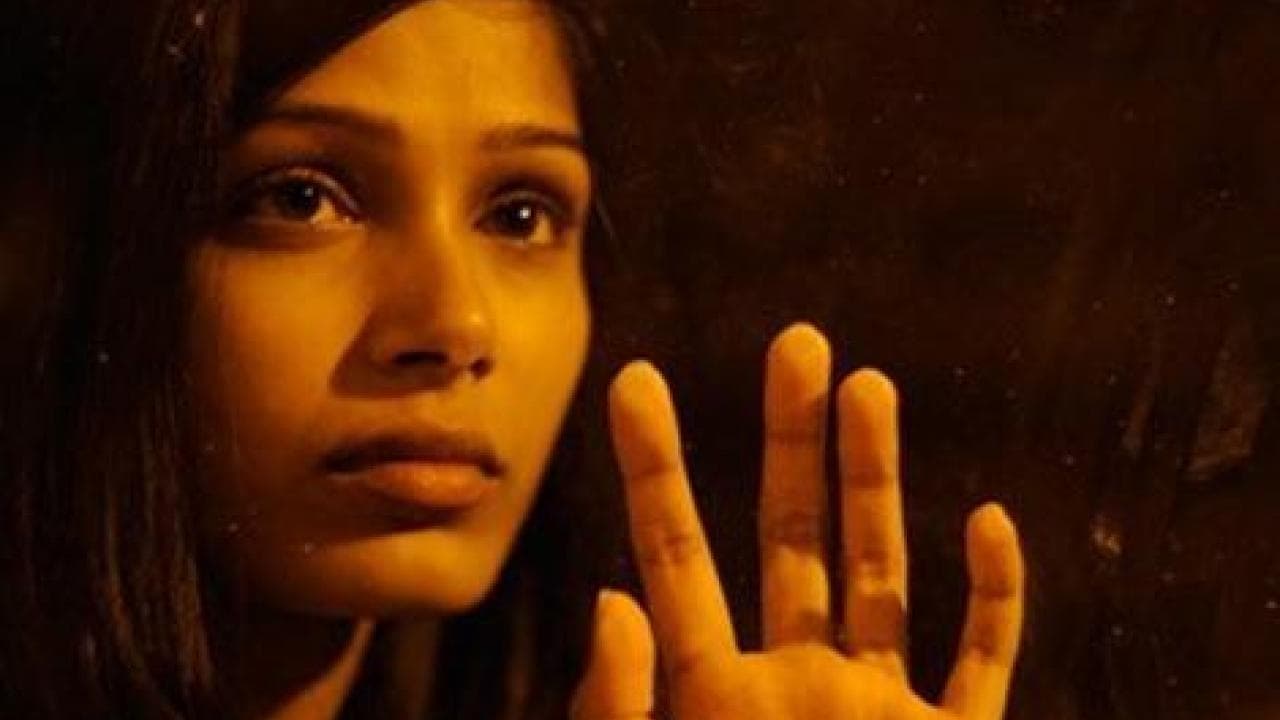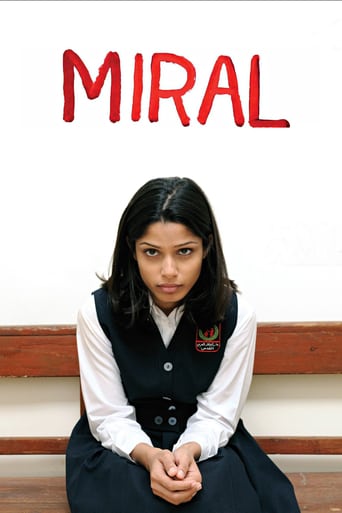

How sad is it that this masterpiece piece of a movie is relatively hidden from the public for purely political reasons? The word is out about what is really happening in Israel and the nearly 70 years of Hell the Palestinian have had to endure. This film does the job of showing the psychological aspects of living in the apartheid war crime capital of the world. And this film teaches you a few things. This film focuses on heroic and strong women having to deal with being born into a tortuous situation, a living Hell on earth. Funny how Israel can not stop stealing land. I literally read an article about the government of Israel green lighting 15 thousand more settlements, I believe that is the third time just this year. And people wonder why Palestinians are so upset. I almost feel sorry for Israel because they will have to answer to a Higher Power for their twisted games. Anyway, I highly recommend this movie because the acting is outstanding and the story is not only true but very inspirational.
... View MoreIgnore some of the terrible reviews this movie has gotten. Watch it and reach your own conclusions.The "story" presented here presents personal stories of people affected by the creation of Israel in former Palestine, a British colony. This movie is not meant to be history, though facts of history are presented, but based on how the situation has affected people in different parts of society of Palestinians and Israelis.Although the movie is from a Palestinian perspective, I didn't feel that it was anti-Israeli, but did show how the partisan situation has affected many negatively, but mostly the Palestinians.I would urge everyone to see this movie with an eye to what happens with both colonialism and war. That some manage to survive does not mean thousands more didn't suffer greatly.This movie has some flaws, and I'll mention some here so you will not think I could not see them. While much of the cinematography is excellent there are times that I had to turn away because the cinematographer must have used a hand-held camera zoomed in so the picture is blurry. Then he moves the camera from side to side or makes a sweep and it almost gave me motion sickness and distracted from the movie. I have no idea why this was allowed, but if this bothers you, just move on because it doesn't last. Sometimes the story line seems truncated. First Miral's mother is a belly dancer then she is married to a moderate, kind, Muslim leader, not an oppositionist. Did I miss something? I think some of the narrative transitions fell on the cutting room floor.Despite any flaws I really urge you to see the movie. It has very beautiful music, excellent acting and is thought-provoking about the situation with the Palestinians and Israelis. Its partisanship is not strident so you don't feel that it is meant to be any type of manifesto. It does leave us wondering why the Oslo agreements of 1993 were never finally agreed upon, though there are understandable reasons. This question is NOT the point of the movie, however.
... View MoreIt is refreshing to visit the Israeli/Palestinian conflict form a vantage too seldom shared in cinema. Director Julian Schnabel once again proves that he understands human responses in the face of political conflict. Rula Jebreal has adapted her own novel which in turn is a biography of her involvement in the history of the Palestinian conflict. It is a touching recounting of the events that took place form 1947 to the present and it leaves the window open for much conversation. The film opens with a party held by Bertha Spafford (Vanessa Redgrave) in 1947 when she asks her guest to forget the conflict outside for a celebration of Christmas: the party is attended by both her Jewish and Arabic friends, the centerpiece being the Christmas tree brought yearly by the Husseini family and then replanted to restore the earth. Hind Husseini (Hiam Abbass) is there and meets Eddie (Willem Dafoe), an American friend of Bertha. A year latter in 1948 there is an Arab-Israeli War, the Deir Yassin Massacre, and the establishment of the state of Israel. The wealthy Hind Husseini encounters 55 starving children, victims of the war, and take s them home to establish what will become the Dar Al-Tifel Institute, a school for Arab orphans that within months grew to a population of 2000. The film then jumps forward and we meet Nadia (Yasmine Al Massri), an abused alcoholic who is imprisoned and there meets devout Muslim Jamal (Alexander Siddig) who later becomes her husband: Nadia, unable to change her life, drowns herself when their child is only 7 years old. It is now 1978 and Jamal brings his daughter Miral (Yolanda El Karam) to the keeping of Hind, reassuring her that he will see her on weekends. Time passes to 1988 and the older Miral (Freida Pinto) is victim to the intifada (uprising), is sent to a refugee camp where she falls in love with the PLO leader Hani (Omar Metwally) and commits to the Palestinian movement to secure a land of peace called Palestine that will be free of the Israeli governance and jurisdiction. Hind encourages Miral to follow her heart and convictions: it is the development of change represented by Hind, Nada, and Miral that personalizes this compelling epic. Though the conflict between Palestine and Israel continues to this day, this film allows us to appreciate the Palestinian response to the loss of their land and home by a international ruling to create the state of Israel. Cinematographer Eric Gautier mixes the hot sun washed Palestine footage of the real intifada and the result is mesmerizing. The real star of this film is Hiam Abbass who as the gradually aging Hind Husseini brings the story to life. The large cast is excellent with special kudos to Alexander Siddig, Omar Metwally, and Freida Pinto: the presence of Vanessa Redgrave and Willem Dafoe add credibility tot he proceedings but their roles are minimal. Julian Schnabel is to be congratulated for bringing to light the 'other side' of the Arab/Israeli conflict. He gives us excellent food for thought. Grady Harp
... View MoreFirst I must say that before seeing this film I had not read the book it was based on so I have to assume that the film follows the book. As the writer of the book also participated in the scripting of the film, one would think that this film is a collaboration between the author of the book and the director Julian Schnabel. This being said, I have tried to review this film without prejudice.When the film ended my first thoughts were that this film would cause a stir as it is directed by a Jew and yet the subject matter of the film shows the Jewish State of Israel in a negative light. My concerns were not as much for the film itself, as it is a well made film, but for the attitude that the Jewish population would have towards the film. In my own experience, as someone who has been directly involved with distribution of film, whenever there is a group that has a negative response the distribution can go one of two ways; the first being limited distribution as some will not support showing the film in their theaters, and the second being a tremendous response to good cinema where theaters will take the risk and book the film at a national level. "Miral" a film that should have widespread distribution, because of what the Jewish population will do in response to the anti Israel theme, this film will be reduced to Art House distribution."Miral" deals with a Palestinian community in turmoil due to change. That change was the effect that the new Statehood of Israel caused. As with any new regimes change is mandatory and an often misunderstood process and the story of "Miral" reflects that process.The film boasts a well woven story, competent acting, and a visceral message. This is a relevant film and well worth seeing. It is multiple-layered and a multiple-leveled film. It would be a shame if the Jewish Community misreads the intention of the film. Films like this do not come around often and avoiding it out of ignorance would be a mistake. .
... View More